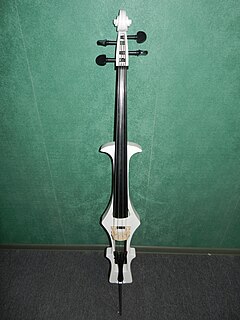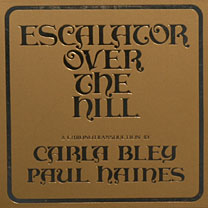
Escalator over the Hill is mostly referred to as a jazz opera, but it was released as a "chronotransduction" with "words by Paul Haines, adaptation and music by Carla Bley, production and coordination by Michael Mantler", performed by the Jazz Composer's Orchestra.

Jaco is the unofficial later title of a 1974 LP album on Paul Bley's Improvising Artists Label. It is notable for being the first professional recording showcasing the talents of Jaco Pastorius and Pat Metheny. The two had become friends in Miami the year before. Their collaboration continued on Metheny's debut Bright Size Life with Bob Moses, recorded in December 1975. The album was released during the following year by ECM, also home to Bley since his Open, to Love from 1972.

McCoy Tyner with Stanley Clarke and Al Foster is an album by McCoy Tyner released on the Telarc label in 2000. It was recorded in April 1999 and features performances of by Tyner with Stanley Clarke and Al Foster. The Allmusic review by Richard S. Ginell states that "This is Tyner reaffirming most of his strengths: the massive tone quality, the two-handed control over the entire keyboard, and the generally uplifting attitude conveyed through the shape of his melodic invention".
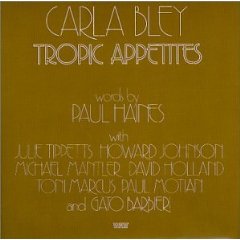
Tropic Appetites is a jazz album by Carla Bley released in 1974, following her debut Escalator over the Hill. The lyrics are contributed by Bley's friend Paul Haines, based on his journeys to Southeast Asia in the preceding years. Unlike on the orchestral Escalator, the band is an octet, with Julie Tippetts as lead vocalist.

I Hate to Sing is a live album by American composer, bandleader and keyboardist Carla Bley recorded at the Great American Music Hall in 1981 combined with three tracks recorded at Grog Kill Studios in 1983 and released on the Watt/ECM label in 1984.
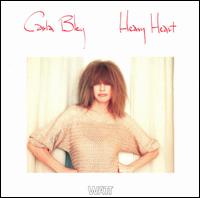
Heavy Heart is an album by American composer, bandleader and keyboardist Carla Bley recorded in 1983 and released on the Watt/ECM label in 1984.
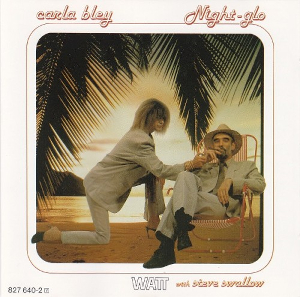
Night-Glo is an album by American composer, bandleader and keyboardist Carla Bley with bassist Steve Swallow recorded and released on the Watt/ECM label in 1985.
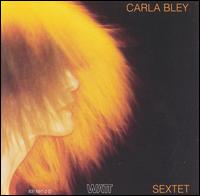
Sextet is an album by American composer, bandleader and keyboardist Carla Bley released on the Watt/ECM label in 1987.

Are We There Yet? is a live album of duets by American composer, arranger, bandleader and keyboardist Carla Bley and bassist Steve Swallow recorded in Europe in 1998 and released on the Watt/ECM label in 1999. It is the pair's third duet recording following Duets (1988) and Go Together (1992).
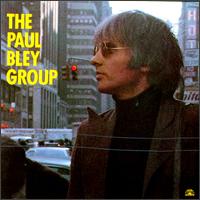
Hot is a live album by Canadian jazz pianist Paul Bley recorded in 1985 and released on the Italian Soul Note label.

Skylark is an album by American jazz saxophonist Paul Desmond featuring Gábor Szabó recorded in 1973 and released on the CTI label.

Eddie Harris Sings the Blues is an album by American jazz saxophonist Eddie Harris recorded in 1972 and released on the Atlantic label.

That Is Why You're Overweight is an album by American jazz saxophonist Eddie Harris recorded in 1976 and released on the Atlantic label.

Steve Kuhn Live in New York is a live album by American jazz pianist and composer Steve Kuhn recorded in 1972 and originally released on the Cobblestone label but rereleased as Raindrops on the Muse label.

The Gil Evans Orchestra Plays the Music of Jimi Hendrix is an album of Jimi Hendrix's compositions arranged by jazz composer, conductor and pianist Gil Evans recorded in 1974 and performed by Evans with an orchestra featuring David Sanborn, Howard Johnson, Billy Harper, and John Abercrombie. The album was re-released with additional tracks on CD in 1988.

Flying Out is an album led by bassist Cecil McBee recorded in 1982 and first released on the India Navigation label.

In Their Own Sweet Way is a 1998 studio album by pianist Dave Brubeck and his quintet. Brubeck was accompanied by his four sons on a recording for the first time.
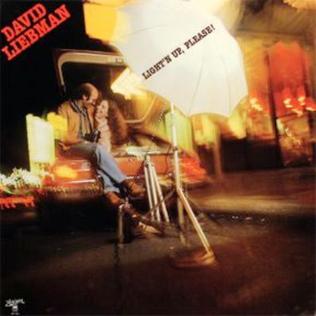
Light'n Up, Please! is an album by saxophonist David Liebman which was recorded in California and New York in 1976 and released on the Horizon label.



